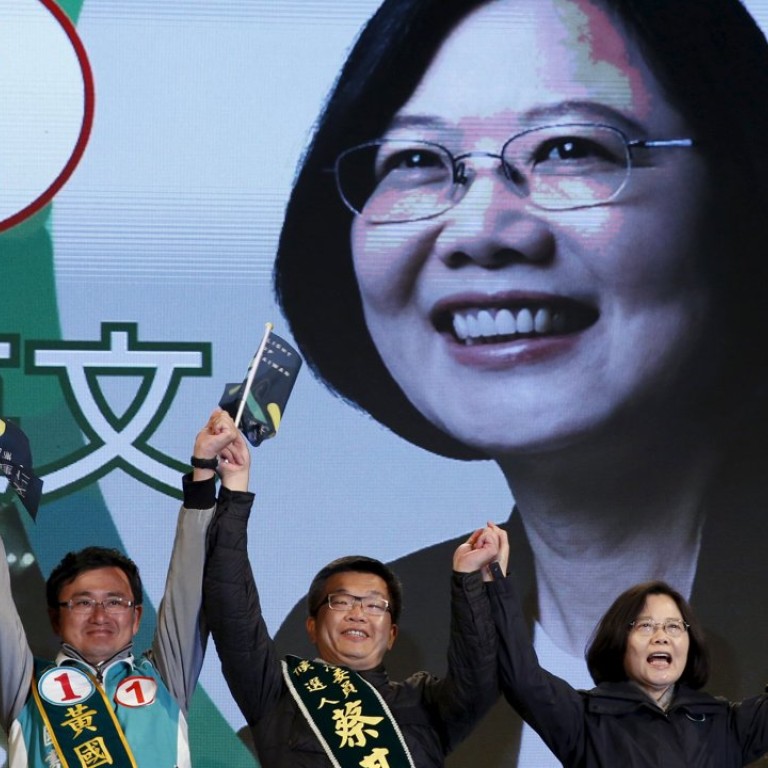
Why the elections in Taiwan matter so much – for Beijing, the region and the US
Jerome A. Cohen says a win for Tsai Ing-wen in Taiwan’s presidential election will be a major test for the mainland leadership and may slow the progress of cross-strait trade agreements
The anticipated turnout for Saturday’s presidential and legislative elections in Taiwan will be relatively modest compared with its great importance in so many respects.
A major question, of course, is whether – if the Democratic Progressive Party’s candidate Tsai Ing-wen wins – her administration can manage a smooth transition to the next stage of Taiwan’s relations with mainland China. Taiwan’s quickly evolving identity has yet to be adequately reflected in cross-strait relations, and it is time for intergovernmental relations to catch up with social progress on the island and its new demands.
READ MORE: Year of the matriarch: Taiwan’s Tsai prepares to join Clinton and Merkel in pantheon of world’s most influential women
How well Tsai can manage the transition will depend in part on whether the DPP can muster a reliable majority in the legislature, either through a coalition or on its own.
Watch: Presidential front-runner Tsai Ing-wen
A third issue – whether Taiwan can mobilise a more effective government than in the recent past – will depend on the outcome of the legislative election.
Fourth, the election will indicate whether Taiwan politics will continue to benefit from a vigorous two-party system or whether the trend towards the dispersion of political representation among numerous smaller parties will continue, making the political process even more challenging than it already is.

The election will also have an impact on the island’s economic policies. If Tsai wins, it may prove more difficult for the trade in services agreement with the mainland to win legislative approval, for the trade in goods agreement negotiations with the mainland to be concluded and for other steps to be taken to integrate the two economies. Correspondingly, we can expect greater emphasis from a new DPP government on expanding relations with its Southeast Asian neighbours, Japan and South Korea, and the US. A Tsai victory would also mean greater emphasis on promoting the economic prospects of the less-affluent members of society.
Watch: Taiwan youth to China: Treat us like a country
Taiwan’s South China Sea policy may also be at stake. Tsai may decide to move the island away from Beijing’s maximum assertive positions and towards a more respectful position regarding the Philippine arbitration and the UN Convention on the Law of the Sea, a process that has already begun under President Ma Ying-jeou.

Even though Ma has taken some notable steps in promoting human rights in Taiwan, he has been rather silent about it when dealing with the mainland of late, apparently in an effort not to embarrass the Xi Jinping ( 習近平 ) regime, which has been heading ever further in the wrong direction.
If Tsai wins the election, I hope that human rights will enjoy greater prominence in cross-strait relations
Note, for example, how little attention human rights received in the Ma-Xi meeting and in Ma’s otherwise excellent January 1 speech. If Tsai wins the election, I hope that human rights will enjoy greater prominence in cross-strait relations, if only to win greater protection for Taiwanese living in and visiting the mainland.
READ MORE: How a softly-spoken bureaucrat rose to be one step away from becoming Taiwan’s first woman president
As to the views of the US, my government knows full well what is at stake in the election and so too do some members of Congress and independent specialists in foreign policy towards Asia. But the American people continue to be unaware of the election and its importance.
As to the views of the PRC, a Tsai victory will test the maturity of Xi’s leadership. It is beset by so many problems and internal strains relating to the military, the diplomatic establishment, the economic elite, the dissident communities and other elements involved in the multiple issues confronting Beijing at home and abroad, in addition to the Taiwan situation, that it will have to respond cautiously and gradually to the new and challenging era introduced by the election.
Jerome A. Cohen is professor and co-director of the US-Asia Law Institute at New York University School of Law and adjunct senior fellow for Asia at the Council on Foreign Relations

